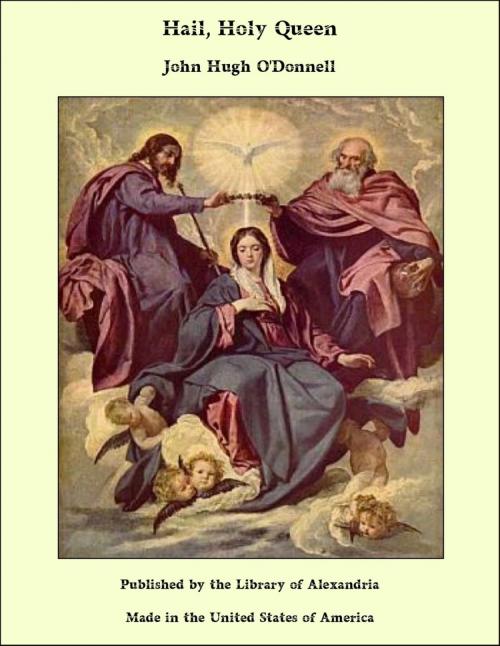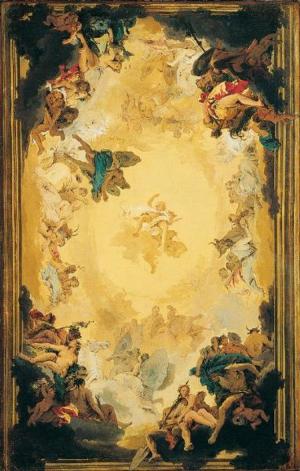| Author: | John Hugh O'Donnell | ISBN: | 9781465615329 |
| Publisher: | Library of Alexandria | Publication: | March 8, 2015 |
| Imprint: | Language: | English |
| Author: | John Hugh O'Donnell |
| ISBN: | 9781465615329 |
| Publisher: | Library of Alexandria |
| Publication: | March 8, 2015 |
| Imprint: | |
| Language: | English |
When the three little ships commanded by Columbus set out from Palos, Spain, to find a new route to the Indies, they sailed in a period of history when almost all the seamen of Christendom made a custom of closing the day with evening prayers. Just before the night watch was set, the ship's boy trimmed the binnacle lamp and then led all hands in reciting the Our Father, the Hail Mary, and the Creed. Then the ship's company sang the "Salve Regina"—Hail, Holy Queen—their favorite hymn and prayer. Columbus mentions the "Salve Regina" in his Journal—this song, old even then—with which the Blessed Mother was saluted each evening at sunset. I do not suppose that it was always sung well; but we may be sure that it was always sung with a fervent good will. In those times of frail sailing ships and uncharted oceans, when so many voyages were ventures into the unknown, sailors were the most religious workers on land or sea. Their life in the immensity of sky and water kept them close to God, and they were unafraid because they had faith in divine protection. They dedicated themselves to Mary, the Star of the Sea, and daily asked her intercession. They even told the time of day as being before or after the Salve Regina Hour. "Hail, holy Queen, Mother of Mercy, our life, our sweetness, and our hope! To thee do we cry, poor banished children of Eve, to thee do we send up our sighs, mourning and weeping in this valley of tears. Turn, then, most gracious advocate, thine eyes of mercy towards us; and after this our exile show unto us the blessed fruit of thy womb, Jesus. O clement, O loving, O sweet Virgin Mary." Such is the ancient hymn. The Blessed Mother has heard it addressed to her countless millions of times since it was first sung in the Benedictine monasteries of the twelfth century. Next to the inspiring Ave Maria itself, it has always been the world's prayer to the Blessed Virgin. It is a canticle deeply spiritual; simple and beautiful, as all deeply spiritual things are. More than any other prayer, more even than the touching "Memorare" of St. Bernard, it shows the position that the Blessed Virgin has in the Divine Pattern. There is nothing of the idolatrous in the Catholic devotion to Mary. It has often been misunderstood, so I should like to make it crystal clear to our non-Catholic friends and also to refresh the memories of Catholics as well.
When the three little ships commanded by Columbus set out from Palos, Spain, to find a new route to the Indies, they sailed in a period of history when almost all the seamen of Christendom made a custom of closing the day with evening prayers. Just before the night watch was set, the ship's boy trimmed the binnacle lamp and then led all hands in reciting the Our Father, the Hail Mary, and the Creed. Then the ship's company sang the "Salve Regina"—Hail, Holy Queen—their favorite hymn and prayer. Columbus mentions the "Salve Regina" in his Journal—this song, old even then—with which the Blessed Mother was saluted each evening at sunset. I do not suppose that it was always sung well; but we may be sure that it was always sung with a fervent good will. In those times of frail sailing ships and uncharted oceans, when so many voyages were ventures into the unknown, sailors were the most religious workers on land or sea. Their life in the immensity of sky and water kept them close to God, and they were unafraid because they had faith in divine protection. They dedicated themselves to Mary, the Star of the Sea, and daily asked her intercession. They even told the time of day as being before or after the Salve Regina Hour. "Hail, holy Queen, Mother of Mercy, our life, our sweetness, and our hope! To thee do we cry, poor banished children of Eve, to thee do we send up our sighs, mourning and weeping in this valley of tears. Turn, then, most gracious advocate, thine eyes of mercy towards us; and after this our exile show unto us the blessed fruit of thy womb, Jesus. O clement, O loving, O sweet Virgin Mary." Such is the ancient hymn. The Blessed Mother has heard it addressed to her countless millions of times since it was first sung in the Benedictine monasteries of the twelfth century. Next to the inspiring Ave Maria itself, it has always been the world's prayer to the Blessed Virgin. It is a canticle deeply spiritual; simple and beautiful, as all deeply spiritual things are. More than any other prayer, more even than the touching "Memorare" of St. Bernard, it shows the position that the Blessed Virgin has in the Divine Pattern. There is nothing of the idolatrous in the Catholic devotion to Mary. It has often been misunderstood, so I should like to make it crystal clear to our non-Catholic friends and also to refresh the memories of Catholics as well.















